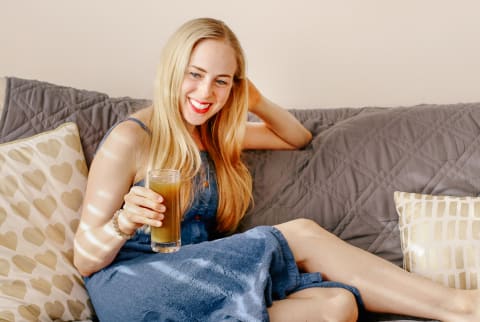Advertisement
Why I Became A Health Coach & What To Know If You Want To Be One


I've always let my gut decide when it comes to the big stuff, and my journey toward becoming a dietitian and health coach is a great example of that.
Why I became a health coach.
As I talk about in my book, The Little Book of Game-Changers, I ultimately gravitated toward becoming a health coach because of my strong need to help people through my work.
At age 23, I started working as an office manager and copywriter for an acupuncturist. But shortly after starting, I realized I wanted to explore something beyond what my BFA in writing had taught me. It actually started with a very specific image I had of myself sitting in a room with a client, listening to them talk, and sharing something that helped them.
After reflecting on how helpful it had been for me to work with a dietitian when I was younger, I decided to study nutrition. I felt drawn to the idea of working in a hospital setting, and I craved the intricate knowledge of how food and nutrition status factor into health and well-being. This decision felt right.
My dietitian training provided excellent education in medical nutrition therapy—I loved feeling useful in the hospital and being part of a team. However, I also knew I wanted to do something outside of that world, so I started taking on a few private clients. I quickly found that for most people, understanding what foods are generally healthy was not actually the problem—where most people struggled was being consistent with healthy habits.
Health coaching opened my eyes to the wide variety of ways there are to help people.
Though I had learned a lot through experience, I wanted to further my education in order to provide better care to my patients and clients.
That's when I decided to pursue my health coaching training. I was 30 at the time, and it coincided with a lot of other big shifts in my life—it really felt like the magic of perfect timing. I immediately found health coaching to be a nice complement to my R.D. work. The holistic approach spoke to how I had been wanting to work with people all along and enabled me to guide my clients more effectively as they built healthy habits to help them thrive.
Health coach training significantly improved my work with clients.
I truly feel like health coaching can be such a great addition to existing skill sets. For me, it helped me provide better support and accountability as I assisted clients in making lifestyle changes, which helped them reach their goals and maintain their success in a balanced way.
Health coaching opened my eyes to the wide variety of ways there are to help people.
Noticing patterns in clients' health struggles has also provided inspiration for workshops, articles, podcast episodes, and books. I also use the communications skills I've learned through health coaching to help share health information in other ways. For example, I do a lot of consulting work, content creation, speaking engagements, hosting virtual events, podcasting, and writing.
My advice to anyone interested in health coaching.
If you intend to make health coaching your job, get clear on what your specific goals are. Who's your target audience? What do you help them with? Where do they hang out on social media that they will see your marketing materials? What type of secure record-keeping system will you use for your clients?
I also strongly recommend carefully tracking finances, creating social media and blog calendars, and regularly analyzing metrics that help you assess which content and marketing materials have the highest engagement so you know where to spend your energy.
Perhaps the biggest piece of advice I wish someone had told me: Do not be afraid to ask for help. We can't be the expert on everything, so hire the experts you need. If you have zero experience designing websites and it's going to cost you thousands of dollars' worth of your work hours trying to DIY, it will totally be worth hiring a designer.
On another note, the coaching world can be so competitive, but there is so much joy and positive energy in collaboration and in building a diverse network of professionals. There are so many ways we can learn from and support each other, and there is room for everyone. We each have something unique to offer. If you only follow people who look like you and do the same things, or if you get sucked into a competitive scarcity mindset, you'll miss out on a lot of incredible experiences, "aha" moments, and opportunities.